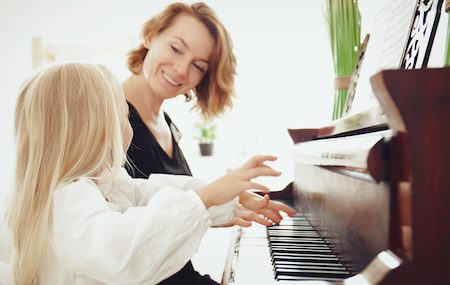If you want your piano to remain in good working condition for years to come, maintenance is an important part of the process.
Homeowners can provide minimal care throughout the year and still have a highly functional piano. But for piano teachers, it takes more work to maintain a piano. Without proper piano care, you might be replacing your piano more frequently than desired.
Pianos are built to be played. But depending on your instruction level, your piano may get heavy usage. And that impacts your piano in different ways than standard residential care.
As with all mechanical devices you use daily, preventative maintenance ensures a long life. It reduces the likelihood of letting more minor issues grow into more significant problems, and keeps the instrument in good working condition for every time you sit down to play.
As a piano teacher, what are some things you can do to protect your piano?
Keep your space clean
If you don’t have a table or other storage area nearby, bring one in. Piano technicians consistently find pens, paperclips, buttons, coins – all the small things you may regularly come in contact with as you move through different piano lessons. Having a place to store or dispose of them prevents you from setting them on the piano, where they ultimately fall in. These tiny items can lodge under a key or between hammers or strings, causing the action to be thrown off as the piano is played. You may not notice it immediately, but this can impact the moving parts.
Avoid liquid
It’s tempting to bring a drink with you when you’ll be sitting near the piano all day, but liquid is one of the harshest enemies for a piano. Glasses can cause ring marks. Liquid can seep into the wood, warping it. You should also avoid flower vases or plants sitting on the piano, as they can leak too and impact the wood. If fluids seep into the action, it can corrode metals and cause the wood to swell, which will impact the piano’s performance.
Piano placement
If you have a piano at home, you may be aware of aesthetics needed to keep your piano well functioning. That doesn’t change when you provide piano lessons, even though it might change where you place them. All acoustic pianos are heavily influenced by their environment. Ensure it’s not near registers or vents where warm or cooled air can impact the wood. Avoid placing the piano where direct sunlight may be a problem. You should also keep it away from drafts through windows or doors. Humidity levels should also remain somewhat constant to keep the piano in good playing condition.
Whether you teach one student a day, or have a regular eight-hour routine, maintenance is key to a long life. Work with a technician for regular tuning and repair. They can help you keep an eye on possible problems, and ensure your piano stays operational through all of your playing. It’s the best way to ensure a long life.


